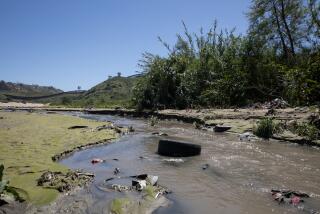Environmental Health Hazards to Be Studied
BERKELEY — A new center run by UC Berkeley and UCLA will study associations between disease and environmental pollutants, including air pollution and pesticides.
It will also help state and county health departments better monitor these links.
“For the first time in this state, we have both the northern university and UCLA in the south working to develop better approaches to tracking environmental health hazards,” said John Froines, head of the UCLA scientists and a professor of toxicology in the university’s School of Public Health.
The center, run by 10 researchers from UC Berkeley and four from UCLA, will be funded by a three-year grant from the U.S. Centers for Disease Control and Prevention.
The new center has received $741,000 for the first year, and university researchers expect a similar amount for the next two years.
The grant is part of a $14.2-million program funded by the CDC to start a nationwide tracking system for health problems related to chemicals, toxins and other substances in the environment.
The researchers, who will work out of facilities at both universities’ schools of public health, plan to focus first on links between air pollution and asthma, looking at data on asthma from a statewide survey and air pollution levels in the San Francisco Bay Area, San Joaquin Valley, and Los Angeles.
Researchers think they will find more cases of asthma with complications in areas with higher pollution, said Dr. John Balmes, the director of the new center and a professor of environmental health sciences at UC Berkeley’s School of Public Health.
“There’s a lot of research that suggests environmental factors may play a role [in asthma], but we don’t have really good numbers on what percent,” he said.
The researchers will use projects they are already working on, including an air pollution study in Fresno and an asthma diagnosis program in Oakland.
The project was prompted by a September 2000 report by the Pew Environmental Health Commission, which found that most states fail to track many health conditions possibly linked to environmental pollutants even when rates of these diseases are dramatically increasing.
The University of California center will be one of three new federally funded university-based centers, called Centers of Excellence for Environmental Public Health Tracking, and the only one on the West Coast. The other two are at Johns Hopkins University in Baltimore and Tulane University in New Orleans. The CDC also funded 20 state and local health departments, including California’s.
“For us it represents an excellent opportunity to collaborate with university researchers,” said Paul English, chief of the epidemiologic investigations unit in the California Department of Health Services.
Part of the center’s work will be deciding which substances in the air have the strongest links to health problems and merit the most attention, Balmes said. These could include a class of pesticides called organophosphates, which have been linked in some studies to neurodegenerative diseases including Parkinson’s, he said.
More to Read
Sign up for Essential California
The most important California stories and recommendations in your inbox every morning.
You may occasionally receive promotional content from the Los Angeles Times.










